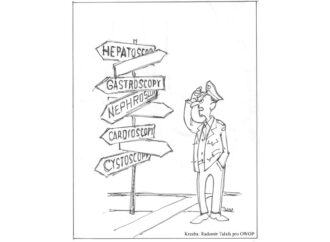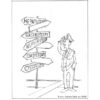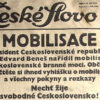 With a Czech-born professor of history and international relations from Boston University about Republican Primaries, role of foreign policy in campaigns and the European confusion about the Republican and Democrats.
With a Czech-born professor of history and international relations from Boston University about Republican Primaries, role of foreign policy in campaigns and the European confusion about the Republican and Democrats.
President Barack Obama has introduced a major doctrinal shift, one towards the Pacific Region and Asia, expecting China to claim a superpower status. Could you comment?
Washington has merely acknowledged the reality of the changing international scene as it noted that the center of gravity has been since the late 1970s moving away from the Atlantic toward the Pacific. China and India have now joined Japan in forming a powerful triangle that may have already surpassed in importance that of the United Kingdom, France, and Germany. It is noteworthy that Russia, a country that has been reduced to selling its natural resources, may no longer enjoy a superpower status. Its rise and fall are the most dramatic themes of the postwar era.
Could you compare foreign policy of the last three years by Barack Obama to the eight-year period of George W. Bush? Has Obama really changed it?
President Bush asserted that the so-called war on terror defined his presidency. He spoke of himself as a “wartime president” and America was, in his view, a “nation at war.” I hoped that Obama would refocus American priorities, and he encouraged such hopes. As a candidate, he marveled that although the Nazis had committed crimes no one had seen before, “we still gave them a day in court, and that taught the entire world about who we are but also the basic principles of rule of law.” I believed Obama when he promised to shut down Guantanamo, to abolish the Military Commissions, and to withdraw from Iraq. I am sympathetic that his political enemies made it very hard for him to achieve such objectives but he should have been more assertive and forceful.
In American eyes, is a departure from Iraq and a successful campaign by NATO over Libya considered a president’s win?
The American public paid no attention to Libya and it won’t play any role in the campaign. As to Iraq, his enemies will blame Obama for the violence that is bound to escalate now that the U.S. troops have left, while his supporters will blame him for not having left earlier.
The Republican Primary Elections have made some splash in the field of projecting the US foreign policy. Some say that the indulgence of several candidates shows how foreign policy has not been the turning point winning Presidential Election since the end of Cold War. Is it, in your opinion, a real trend that candidates know a very little about foreign policy and their advisors work on such issue later in the contest?
Except at a time of war, foreign policy was hardly ever at the center of presidential campaigns in this country. This was certainly true throughout much of the postwar era. Americans understand that a sophisticated understanding of foreign policy is not a precondition of a successful presidency in the United States. For instance, Ronald Reagan who is said to have triumphed in the foreign policy arena had but a rudimentary understanding of it. He acted on instinct and intuition. He sought to promote the values that he held dear and resisted what he considered despicable. Such a solid foundation is more useful to a president than being able to name all the members of the Chinese politburo. Of course, ignorance is never good.
If a Republican wins the Presidential Election this November, will the EU feel it in international relations since January 2013?
I don’t believe that there’s much of a difference between a Democratic or Republican president’s attitude toward Europe. All presidents swear to “preserve, protect and defend the Constitution of the United States.” In doing so, they accept the task of promoting American interests, not Republican or Democratic interests. Consequently, they tend to act abroad alike.
What is, in your experience, a trend regarding foreign policy topics in the campaigns? Does some kind of narrow-minded labeling during tought campain fight effect future President in his decisions?
Do tough campaigns form presidents? All campaigns for the White House are tough, extremely so, and they are bound to leave traces on the minds of those who fought them. But people at the top are tougher than the campaigns. They are able to form alliances with their former enemies. Think about Ronald Reagan and George H. W. Bush or Barrack Obama and Hillary Clinton! Normal people would be unable to be in the same room after the blistering Reagan vs. Bush or Obama vs. Clinton campaigns, but they chose to work together.
Generally, does Europe understand American Primaries?
Obviously, some have a remarkably deep understanding of the primaries but others adhere to a simplistic view of the American political scene. Political parties in this country are much less structured and disciplined than those in Europe. In fact, it’s impossible to join a party the way one does it in Europe. Here one simply declares oneself at an election time as a Democrat, Republican, or Independent, and there are no membership fees or orders how to vote.
Finally, some Europeans see Republicans as being “right“ and Democrats as “left.“ The truth is that there isn’t a homogeneous Republican or Democratic party in the United States. Republicans in Massachusetts are typically much less conservative that Democrats in Mississippi. One of my own senators is a Republican who took the seat of Ted Kennedy, one of the most liberal members of Congress for decades, and I can’t tell the difference.
Igor Lukeš is a Czech-born professor of international relations and history at Boston University, USA. He left Czechoslovakia in the 1970’s and got his education in the US – BA/MA, PhDr, Charles University, Prague; MALD, PhD, Fletcher School of Law and Diplomacy, Tufts University. He has written about Europe between the world wars and about contemporary developments in East Central Europe, Russia, and the Balkans. His work has won the support of various prestigious institutions.










Leave a Comment
Your email address will not be published. Required fields are marked with *